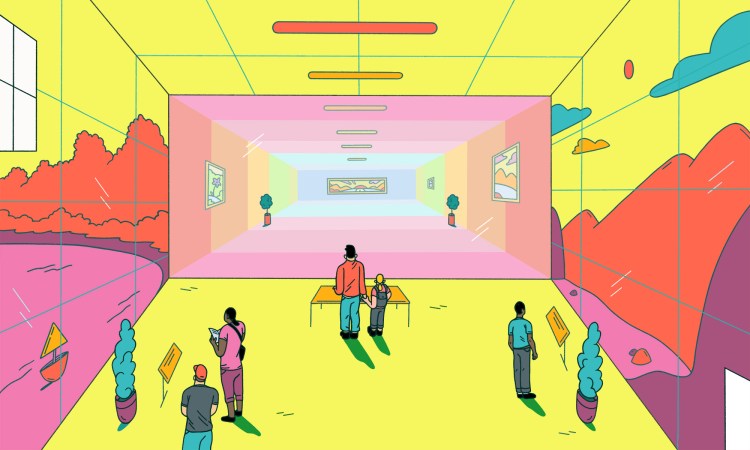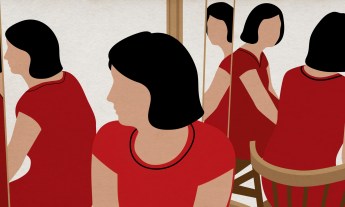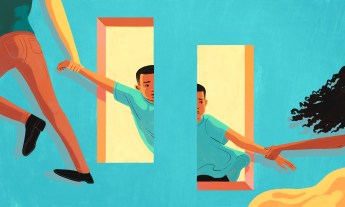
Julian Maha and Michele Kong have been grabbed, yelled at, and criticized in public places when their son had a meltdown. So they started an organization that helps families like theirs feel welcome wherever they go.
Like many kids his age, six-year-old Abram Maha was fascinated by mummies. So one summer day in 2014, his parents, physicians Julian Maha and Michele Kong, took him to one of his favorite places: the mummy exhibit at a museum in their hometown of Birmingham, Alabama. It was busy that day, the lobby was packed, and the place was a barrage of noises, smells and sounds. For many children with autism, including Abram, this kind of environment results in full-on sensory overload. To deal with it, he starts “stimming” — performing repetitive behaviors such as bouncing, hand flapping, jumping and shouting. That day, Abram was “extra bouncy,” recalls Maha (TEDxBirmingham Talk: We all seek the same sense of inclusion). A security guard came over and, according to Maha, “told us that if we could not get under our son under control, we would be asked to leave.” Maha and Kong explained that Abram was not being intentionally disruptive; he has autism. The guard responded, “He doesn’t look autistic,” and told the family to leave.
Unfortunately, situations like these aren’t uncommon for the families of kids with autism. Abram, now 10, was diagnosed with autism at age four. Surprisingly, even though they’re both doctors — Kong is a specialist in pediatric critical care; Maha, now retired, worked in emergency medicine — the couple knew little about autism. “Our knowledge of autism was limited to a single paragraph in our medical school books,” says Maha. So he and Kong learned as they went. They quickly realized their son was hypersensitive to noise, lights and touch. “Getting a haircut was physically painful to him,” Maha says. “Every single blade of hair that was cut was akin to 1,000 paper cuts.”
Imagine going to a concert but being unable to block out any of the noises, touches, smells and movements happening around you. The volume of each of these sensations is turned way up: Whispers become yells, the odors of hot dogs and popcorn are stomach-churning, flashing lights are blinding. This can be the experience of people with sensory processing issues — since they can’t filter out sensory input like those with neurotypical processing systems, they feel bombarded by every piece of sensory information occurring in a space all at once. Children with these issues try to relieve their fear and pressure by crying, covering their ears, closing their eyes, screaming, shaking, hitting or exhibiting other behaviors.
As Abram grew up, Maha and Kong came to see the lingering — and large — social stigma around autism. Like the security guard at the museum, many people don’t understand sensory overload and stimming, and they don’t know how to react when it happens, according to Maha. For example, a 14-year-old boy in Arizona was pinned to the ground in 2017 by a police officer who’d assumed the teen’s irregular behavior was caused by drugs, even though the boy yelled, “I’m stimming!” During episodes like these, families with children on the spectrum can be derided, criticized or even shunned. Adults have grabbed Abram and yelled at the couple, says Maha, and he’s heard similar stories from other families. As a result, “routine outings are difficult not only from the sensory standpoint but also from the social prejudice standpoint,” he says. “A lot of these individuals and their families end up withdrawing from communities and living lives of isolation.”
After talking to many families of kids with sensory issues, Maha and Kong realized one thing was needed to help them feel welcome and safe: education. So in 2013, the couple started a Birmingham nonprofit, KultureCity, whose goal is to change the way our cultures treat people with sensory differences. Yes, they’re spelling culture with a “K” — to signify a “culture” that is different: accepting of neurodiversity and friendly toward kids with autism. “Autistic individuals have great potential, but we have to give them a chance,” says Maha. “We need to create environments where they can thrive, where they can learn better ways to teach themselves. We need to help communities understand.”
KultureCity’s first initiative: a program that trains employees in public places how to work compassionately with people who have sensory issues. Maha and Kong collaborated with physicians, nurses, speech therapists, occupational therapists and behavioral therapists to create a class that teaches people “what sensory needs are, who they affect in our population, why should someone without a personal connection care about it, and what are the different things you can do when interacting with people with sensory needs in order to make the experience more inclusive,” Maha says. In the training, staff also learn what it feels like to experience sensory overload and the different ways that people experiencing sensory overload might respond.
The watchwords: sensitivity, empathy, respect and kindness. The KultureCity training teaches people how to approach a child in the midst of sensory overload — they should do so calmly and not shout, yell or touch the child and make sure they and their family members have some privacy and space. It’s important to always ask families for consent before doing anything, cautions Maha. Workers must also recognize that people with autism sometimes use different tools — such as an iPad or a picture card — to communicate. Maha has spoken to families who’ve reported that some employees in public spaces refused to accept these alternate means, stripping their children of their voice and their dignity. The Birmingham Zoo was the first venue to train with KultureCity, and others quickly signed on.
In 2016, the the Quicken Loans Arena — home to the Cleveland Cavaliers, Monsters and Gladiators — needed an assist. Carson, a kid sports fan with autism, was not allowed into a Monsters hockey game at the arena (ironically, on Autism Awareness Night) because security staffers were confused and concerned about the electronic device he used to communicate. Upset, his mother tweeted at Cavaliers owner and Quicken Loans founder Dan Gilbert. Gilbert noticed, and Antony Bonavita, a senior vice president for facility operations and himself the father of a son with autism, spoke to Carson’s family, then took the lead to make things better. KultureCity was brought in to make the 20,562-seat Quicken Loans Arena, which locals call the Q, into a welcoming place for guests with autism and sensory needs. Q staffers from across the arena — from security guards to food vendors — took part in the training and shared their ideas.
Now the Q arena offers special “sensory bags” for visitors. These loaner bags are available at guest services and include noise-cancelling headphones, fidget toys, a weighted lap pad, and visual cue cards so people who are overwhelmed or nonverbal can point to what they need. The bag also includes a lanyard for sensory-sensitive guests to wear; people wearing the lanyards and their family members can to leave and re-enter the arena when they need to take some time outside. KultureCity also helped the Q create a sensory-friendly room, the first in the NBA. This quiet space has many calming features, such as a sensory wall with tactile toys, a soothing bubble wall, comfortable seating such as a rocking chair and bean bags, and a listening station with headphones and relaxing music. Impressed by the Q, the NBA has brought the KultureCity program to 13 other arenas. Three (Oklahoma City, Sacramento and Utah) have opened sensory-friendly rooms, and four more arenas plan to become sensory inclusive by the start of the 2018-2019 basketball season. In April 2018, the NBA Store in New York became the first retail store to receive KultureCity training.
Since its launch in 2013, KultureCity has trained staff all over the US. They’ve worked with 14 zoos and aquariums, including the New England Aquarium in Boston and the Audubon Zoo in New Orleans; sports teams like the New York Jets; and several locations of the Urban Cookhouse restaurant chain. (Families can find a list of sensory-inclusive venues on the KultureCity website.) Maha hopes his organization’s training will move beyond the US soon too. “Recently people in Australia reached out,” he says. “They want to make the Australian Football League sensory inclusive.” On April 2 (World Autism Awareness Day), KultureCity released an app for Android and iOS. It allows users to search for sensory-inclusive places near them, rate them, join chat rooms for people in their area, and read and watch resources — on everything from speech therapy to hygiene — curated by KultureCity.
Since KultureCity began its work, Maha has been gratified to meet people who now feel comfortable enough to take their children to the zoo or a game. Having a good experience with staffers can make all the difference in creating a positive experience, says Maha. One area where he would like to see KultureCity consult is air travel. Imagine, he says, “a sensory-inclusive checkline at the airport where people with sensory issues can go and get screened.”
True inclusion, says Maha, is “when we embrace everyone in our community — not just those you know who are ‘normal.’” This inclusion can take so many different forms. It can be a waiter understanding when a child flaps their hands at lunch, a stadium that offers noise-canceling headphones, or a quiet room in the midst of the hubbub. And the basic ingredients needed to create accommodating spaces are simple: education, empathy and respect. “Deep down, despite our external differences, we all seek the same things,” says Maha. “We seek acceptance, we seek inclusion, and we seek community.”
Watch Julian Maha’s TEDxBirmingham Talk here:

















